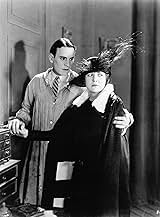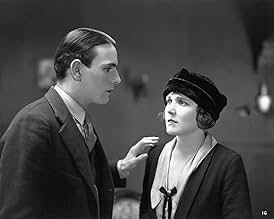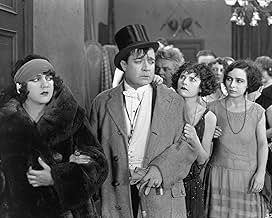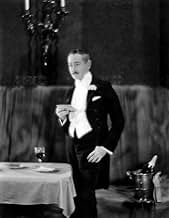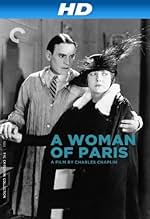AVALIAÇÃO DA IMDb
6,9/10
6,4 mil
SUA AVALIAÇÃO
Uma mulher sustentada pelo marido encontra seu ex-noivo e se vê dividida entre o amor e o conforto.Uma mulher sustentada pelo marido encontra seu ex-noivo e se vê dividida entre o amor e o conforto.Uma mulher sustentada pelo marido encontra seu ex-noivo e se vê dividida entre o amor e o conforto.
- Prêmios
- 3 vitórias no total
Charles K. French
- Jean's Father
- (as Charles French)
Nellie Bly Baker
- Masseuse
- (não creditado)
Henry Bergman
- Head Waiter
- (não creditado)
Charles Chaplin
- Station Porter
- (não creditado)
Frank Coghlan Jr.
- Boy
- (não creditado)
Harry d'Abbadie d'Arrast
- Man in Nightclub
- (não creditado)
Stella De Lanti
- Revel's Fiancée
- (não confirmado)
- (não creditado)
Jean de Limur
- Man in Nightclub
- (não creditado)
Charles Farrell
- Man in Nightclub
- (não creditado)
Bess Flowers
- Mannequin
- (não creditado)
Karl Gutman
- Orchestra Conductor
- (não creditado)
Enredo
Você sabia?
- CuriosidadesThe reissue of this film, with a musical score and new cut by Sir Charles Chaplin, was the last work of his entire film career. By then, the 87-year-old Chaplin was visibly frail but still walking. His score was aided by arranger Eric James, and he took a small theme from Monsieur Verdoux (1947), but most of the score was Chaplin's. The film was reissued posthumously in 1977 with the new score to overwhelming critical and public praise. At that time, many critics praised it (as in the trailer) as one of the best films ever made.
- Citações
[Intertitle]: Time heals, and experience teaches that the secret of happiness is in service to others.
- Versões alternativasDuring 1976, Chaplin was preparing a reissue of A Woman of Paris/Sunnyside but died before completion. The project was completed after his death, and the films were reissued in the United States by Kino International Corp. in 1978. This version, however, dispensed with an opening subtitle, as well as a few brief insert shots.
- ConexõesFeatured in Chaplin Today: Modern Times (2003)
Avaliação em destaque
The second film in my somewhat unusual Charles Chaplin double feature (after the delightfully black 'Monsieur Verdoux (1947)'), 'A Woman of Paris' is perhaps the silent comedy master's least mentioned film, perhaps partly due to it not actually being a comedy, or because Chaplin himself appears only in a very brief cameo role. His first and, I'll venture, his only strictly dramatic feature, the film traces the romantic dilemma of a young French woman living in Paris. It was Chaplin's first film with United Artists which he had founded in 1919 with Douglas Fairbanks, Mary Pickford and D.W. Griffith. Originally entitled 'Public Opinion' and then 'Destiny,' Chaplin considered a dozen more titles before he finally settled on a name.
Marie St. Clair (Edna Purviance) and her romance Jean Millet (Clarence Geldart), an aspiring artist, residents of a small French village, have plans to move to Paris and get married. However, unfortunate circumstances delay their plans, and Marie impulsively boards the train without Jean. A year or so later, Marie has assimilated into the upper-class lifestyle of Paris, having become the mistress of a wealthy, cynical businessman, Pierre Revel (Adolphe Menjou). It is then that she and Jean suddenly meet again. Though there are undoubtedly still feelings between them, Marie must decide whether she can sacrifice all of Pierre's luxuries to pursue the man that she loves.
Written, produced and directed by Chaplin, 'A Woman of Paris' is a tightly-paced drama/romance, employing a lot of dialogue (somewhat unusual for Chaplin, who usually relied on extended slapstick comedic set pieces to drive his silent films) and a three-way relationship that has since become commonplace in films of this sort. The film allowed Chaplin to extend his skills beyond the realm of the lovable little Tramp. Unfortunately, this seemingly was not what audiences wanted. Perhaps perceived as a harmful satire of the American way of life, 'A Woman of Paris' was banned in several US states on the grounds of immorality, and it was a commercial flop. Chaplin had conceived the film as a means of launching the individual acting career of Edna Purviance, though this bid was unsuccessful. It did, however, make an international star of Adolphe Menjou.
Many critics, despite the poor box office performance, praised the film's startling realism. Notably, director Michael Powell ('Black Narcissus,' 'Peeping Tom') cited 'A Woman of Paris' as his greatest inspiration to become a filmmaker. In 1976, a frail Charles Chaplin just one year before his death reissued the edited film with a new musical score he had composed, aided by music arranger Eric James. A criminally underrated silent classic, 'A Woman of Paris' is yet another testament to Chaplin's undeniable cinematic genius.
Marie St. Clair (Edna Purviance) and her romance Jean Millet (Clarence Geldart), an aspiring artist, residents of a small French village, have plans to move to Paris and get married. However, unfortunate circumstances delay their plans, and Marie impulsively boards the train without Jean. A year or so later, Marie has assimilated into the upper-class lifestyle of Paris, having become the mistress of a wealthy, cynical businessman, Pierre Revel (Adolphe Menjou). It is then that she and Jean suddenly meet again. Though there are undoubtedly still feelings between them, Marie must decide whether she can sacrifice all of Pierre's luxuries to pursue the man that she loves.
Written, produced and directed by Chaplin, 'A Woman of Paris' is a tightly-paced drama/romance, employing a lot of dialogue (somewhat unusual for Chaplin, who usually relied on extended slapstick comedic set pieces to drive his silent films) and a three-way relationship that has since become commonplace in films of this sort. The film allowed Chaplin to extend his skills beyond the realm of the lovable little Tramp. Unfortunately, this seemingly was not what audiences wanted. Perhaps perceived as a harmful satire of the American way of life, 'A Woman of Paris' was banned in several US states on the grounds of immorality, and it was a commercial flop. Chaplin had conceived the film as a means of launching the individual acting career of Edna Purviance, though this bid was unsuccessful. It did, however, make an international star of Adolphe Menjou.
Many critics, despite the poor box office performance, praised the film's startling realism. Notably, director Michael Powell ('Black Narcissus,' 'Peeping Tom') cited 'A Woman of Paris' as his greatest inspiration to become a filmmaker. In 1976, a frail Charles Chaplin just one year before his death reissued the edited film with a new musical score he had composed, aided by music arranger Eric James. A criminally underrated silent classic, 'A Woman of Paris' is yet another testament to Chaplin's undeniable cinematic genius.
- ackstasis
- 28 de mai. de 2007
- Link permanente
Principais escolhas
Faça login para avaliar e ver a lista de recomendações personalizadas
- How long is A Woman of Paris: A Drama of Fate?Fornecido pela Alexa
Detalhes
- Data de lançamento
- País de origem
- Central de atendimento oficial
- Idioma
- Também conhecido como
- A Woman of Paris: A Drama of Fate
- Locações de filme
- Empresa de produção
- Consulte mais créditos da empresa na IMDbPro
Bilheteria
- Orçamento
- US$ 351.000 (estimativa)
- Faturamento bruto mundial
- US$ 12.921
- Tempo de duração1 hora 22 minutos
- Mixagem de som
- Proporção
- 1.33 : 1
Contribua para esta página
Sugerir uma alteração ou adicionar conteúdo ausente

Principal brecha
By what name was Casamento ou Luxo (1923) officially released in India in English?
Responda
